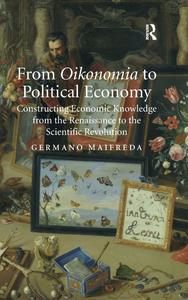
Free Download From Oikonomia to Political Economy: Constructing Economic Knowledge from the Renaissance to the Scientific Revolution by Germano Maifreda
English | November 15, 2012 | ISBN: 1409433013, 1138108391 | True EPUB | 312 pages | 2 MB
Renaissance Europe witnessed a surge of interest in new scientific ideas and theories. Whilst the study of this 'Scientific Revolution' has dramatically shifted our appreciation of many facets of the early-modern world, remarkably little attention has been paid to its influence upon one key area; that of economics. Through an interrogation of the relationship between economic and scientific developments in early-modern Western Europe, this book demonstrates how a new economic epistemology appeared that was to have profound consequences both at the time, and for subsequent generations.
Dr Maifreda argues that the new attention shown by astronomers, physicians, aristocrats, men of letters, travellers and merchants for the functioning of economic life and markets, laid the ground for a radically new discourse that envisioned 'economics' as an independent field of scientific knowledge. By researching the historical context surrounding this new field of knowledge, he identifies three key factors that contributed to the cultural construction of economics.
Firstly, Italian Humanism and Renaissance, which promoted new subjects, methods and quantitative analysis. Secondly, European overseas expansion, which revealed the existence of economic cultures previously unknown to Europeans. Thirdly factor identified is the fifteenth- and sixteenth-century crisis of traditional epistemologies, which increasingly valued empirical scientific knowledge over long-held beliefs.
Based on a wide range of published and archival sources, the book illuminates new economic sensibilities within a range of established and more novel scientific disciplines (including astronomy, physics, ethnography, geology, and chemistry/alchemy). By tracing these developments within the wider social and cultural fields of everyday commercial life, the study offers a fascinating insight into the relationship between economic knowledge and science during the early-modern period.
